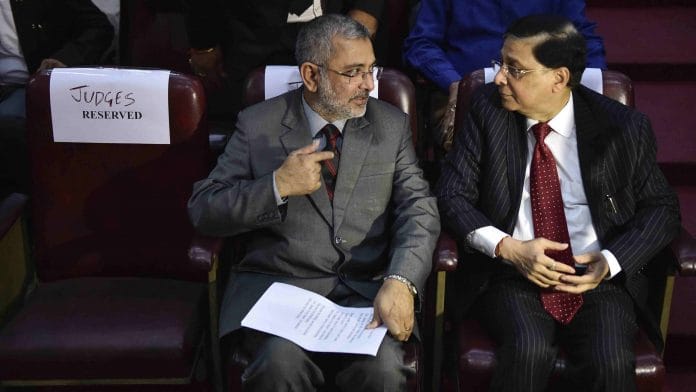Days after his retirement, Justice Kurian Joseph talks to ThePrint about his decision to shun post-retirement govt jobs & defends the judges presser.
New Delhi: Justice Kurian Joseph, who retired from the Supreme Court last week, has defended his decision to participate in the 12 January press conference that had set off the greatest judicial crisis in recent Indian history.
Days after his retirement, he told ThePrint in an interview that the presser followed the failure of all attempts to persuade the then Chief Justice of India (CJI) Dipak Misra to hold a full-court meeting to address pressing issues.
At the unprecedented press conference, Justice Joseph, incumbent CJI Ranjan Gogoi, Justice J. Chelameswar (retired) and Justice M.B. Lokur raised questions about the judiciary’s functioning and independence under CJI Misra, evoking praise from some quarters and criticism from others.
Among the concerns cited was the irregular distribution of sensitive cases, notably that of the investigation into the death of trial court judge B.H. Loya, who was looking into the alleged fake encounter of Sohrabuddin Sheikh.
In the immediate aftermath, Justice Joseph told ThePrint, a few brother judges of the top court had approached the four and conveyed that they would have liked to have participated in the press conference as well.
“That was one reaction,” Justice Joseph told ThePrint in the sprawling lawns of his official residence. “However, there was another reaction where they (the top court judges) said you did not tell us that things were not going well. So both reactions were there,” he added.
Justice Joseph said the critics, perhaps, didn’t know of the efforts made by the judges in the preceding days to have their concerns heard.
“We tried to find a solution within the institution,” he added. “Since all attempts failed, the barking dogs kept barking, but we finally had to bite in order to protect the interest of the master.”
Asked if they had taken other judges into confidence, Justice Joseph replied in the negative. “No. We did not approach anybody else,” he said. “Because earlier attempts (at seeking a full-court meeting to address the problems) were also undertaken just by the four of us.”
Govt interference in judiciary
Speaking to ThePrint, Justice Joseph said that though the crisis he and his three brother judges had sought to highlight had not yet passed entirely, there had been significant changes in the system.
“The biggest change is that there is a lot more transparency now,” he told ThePrint, “There’s an attempt to introduce a system and practice as opposed to an individual taking decisions,” he said.
He, however, observed that though the Centre did not interfere with decisions on the judicial side, the same could not be said of appointments and transfers.
“The friction started when the Centre interfered with the independence of the judiciary,” he said. “This friction was not there earlier, because there was no interference. The moment the interference began, the friction began,” he added.
As an example of executive interference, he cited how the government often took months to clear judicial appointments recommended by the collegium.
Referring to the appointment of four judges elevated to the Supreme Court in October, Justice Joseph said the order for it was signed within 48 hours. This, he said, meant the government could move fast if it wanted to. “If they want to delay, then they can,” he added.
Also read: Modi government too wants pliant judges & that’s why post-retirement jobs will stay
Retirement plans
Justice Joseph was the third most senior judge of the top court and a member of the collegium when he retired on 29 November.
Apart from the press conference, he had made headlines with his statements dismissing any possibility of him taking up a post-retirement job offered by the government. This was widely celebrated because the trend of retired judges taking up government-offered jobs is often frowned upon as it is seen as a possible impediment to the objectivity of judges while in office.
Talking about his decision to keep away from any such offer, Justice Joseph remarked that while the government had, on the one hand, created a statute allowing retired judges to head tribunals and other quasi-judicial bodies, on the other hand, “the Centre humiliated judges”.
“By this, I do not mean to say that the other judges who have been appointed to tribunals have gone (to the government) with begging bowls,” he said.
“Having been in a constitutional post, I have always held my head high. You should not bend it down for roti-chawal,” he added.
Speaking at his farewell on the lawns of the Supreme Court Thursday, the judge had revealed that he would continue to stay in the national capital and use his talent at “mediated arbitration” for court-appointed panels.
Also read: Kurian Joseph, the ‘nicest’ judge who walked the line between church and judiciary







these guys are same. they are aligned to their bosses who selectedthem to this post. just this is game. tomorrow if congress govt cones back he will become chairman of some committee or so. why they wanted some specific cases to them? for chamber adjustment? he kept on cribbing on Misra bcos he was picked by BJP. gogoi is congress picked judge n hence he is happy under. they are politicizing the judiciary. these 4 guys lost in the game.
ALL REMOTE CONTROLLED SUSPECT ,BELIEVE EVERYONE IN THEIR VICINITY IS REMOTE CONTROLLED, MR. KURIAN WHAT KIND OF RETARDED ANSWER BY YOU, YOU CALL YOURSELF A SUPREME COURT JUDGE, GLAD THEY RETIRED YOU
With the retirement of Justice Dipak Misra and the appointment of Justice Ranjan Gogoi as CJI, the institution seems to be in safe hands.
Perhaps these four judges have started an ominous precedent of going public, something Supreme Court judges avoided. Maintaining silence and guarding their respect and integrity was the norm, until now. Giving interviews and imputing motives of a senior judge based on hearsay rather than solid proof, hardly earns respect and credibility.